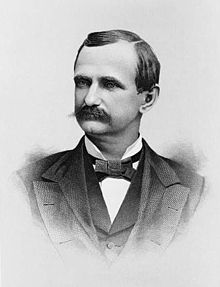Leonidas C. Houk
| Leonidas Campbell Houk | |
|---|---|
 |
|
| Member of the U.S. House of Representatives from Tennessee's 2nd district |
|
|
In office March 4, 1879 – May 25, 1891 |
|
| Preceded by | Jacob Montgomery Thornburgh |
| Succeeded by | John C. Houk |
| Personal details | |
| Born |
June 8, 1836 Boyds Creek, Tennessee, U.S. |
| Died | May 25, 1891 (aged 54) Knoxville, Tennessee, U.S. |
| Resting place |
Old Gray Cemetery Knoxville, Tennessee |
| Political party | Republican |
| Spouse(s) | Elizabeth Smith Mary Belle Von Rosen |
| Profession | Politician, Lawyer |
| Religion | Methodist |
Leonidas Campbell Houk (June 8, 1836 – May 25, 1891) was an American politician and a member of the United States House of Representatives for the 2nd congressional district of Tennessee. Between 1878 and 1891, Houk was elected to seven consecutive terms in the House, during which time he helped solidify the Republican congressional dominance in East Tennessee that remains to the present day. Houk fought for the Union Army during the Civil War, and rose to the rank of colonel within a few months. Largely self-trained as a lawyer, Houk served as a state circuit court judge from 1866 to 1869.
Houk was born near Boyds Creek, Tennessee in Sevier County on June 8, 1836. He lost his father at a young age, and grew up in poverty. Although he attended local schools for less than three months, he managed to educate himself by reading books. He eventually learned the trade of cabinet-making, and worked in this trade for several years in Clinton, Tennessee.
In 1853, Houk was charged in Maryville with shooting a gun near a public road. At his trial, Knoxville lawyer Oliver Perry Temple (1820–1907), who happened to be in the courtroom, arose and spoke on Houk's behalf, and convinced the judge to grant Houk leniency. As a result of this incident, Houk became interested in law, and began making regular stops by Temple's Gay Street office to borrow books on law and legal theory. In 1859, Houk was admitted to the bar, and commenced practice in Clinton.
Like most rural East Tennesseans, Houk supported the Union during the Civil War. In 1861, Houk engaged prominent secessionist Henry S. Foote in a debate in Clinton, and in June of that year he represented Anderson County at the East Tennessee Convention, which sought to create a separate, Union-aligned state in East Tennessee. In August 1861, Houk travelled to Kentucky, where he enlisted in the Union Army as a private.
...
Wikipedia
